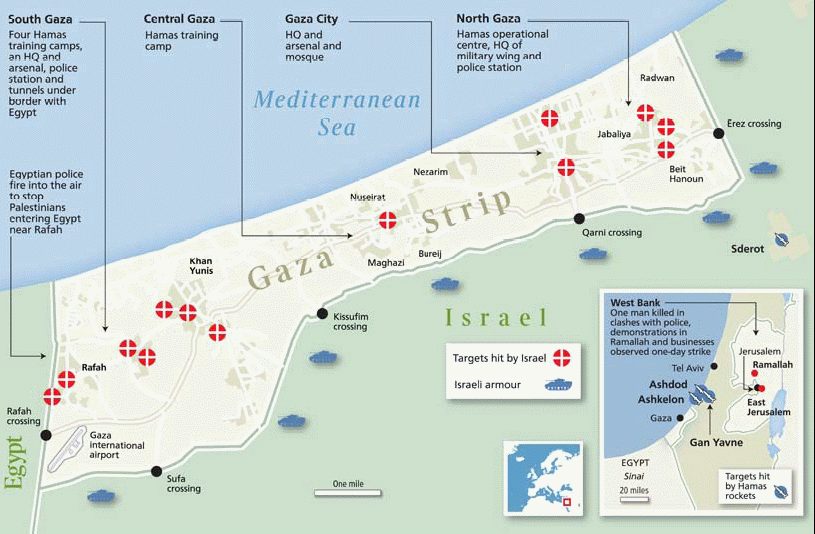Blueprint for Gaza attack was long planned
Jonathan Cook | 15.01.2009 11:41 | Analysis | Anti-militarism | Palestine | World

Having struck thousands of targets from the air in the first phase, followed by a ground invasion that saw troops push into much of Gaza, a third phase would involve a significant expansion of these operations.
It would require the deployment of thousands of reserve soldiers, who are completing their training on bases in the Negev, and the destruction and seizure of built-up areas closer to the heart of Gaza City, Hamas’s key stronghold. The number of civilian casualties could be expected to rise rapidly.
A fourth phase, the overthrow of Hamas and direct reoccupation of Gaza, is apparently desired neither by the army nor Israel’s political leadership, which fears the economic and military costs.
An expansion of “Operation Cast Lead” is expected in the next few days should Israel decide that negotiations at the UN and elsewhere are not to its liking. Israeli warplanes have dropped leaflets warning Gaza residents of an imminent escalation: “Stay safe by following our orders.”
Last week Ehud Olmert, the prime minister, warned that the army had still not exhausted its military options.
Those options have long been in preparation, as the defence minister, Ehud Barak, admitted early on in the offensive. He said he and the army had been planning the attack for at least six months. In fact, indications are that the invasion’s blueprint was drawn up much earlier, probably 18 months ago.
It was then that Hamas foiled a coup plot by its chief rival, Fatah, backed by the United States. The flight of many Gazan members of Fatah to the West Bank convinced Mr Barak that Israel’s lengthy blockade of the tiny enclave alone would not bring Hamas to heel.
Mr Barak began expanding the blockade to include shortages of electricity and fuel. It was widely assumed that this was designed to pressure the civilian population of Gaza to rebel against Hamas. However, it may also have been a central plank of Barak’s military strategy: any general knows that it is easier to fight an army -- or in this case a militia -- that is tired, cold and hungry. More so if the fighters’ family and friends are starving too.
A few months later, Mr Barak’s loyal deputy, Matan Vilnai, made his now infamous comment that, should the rocket fire continue, Gazans would face a “shoah” -- the Hebrew word for holocaust.
The shoah remark was quickly disowned, but at the same time Mr Barak and his team began proposing to the cabinet tactics that could be used in a military assault.
These aggressive measures were designed to “send Gaza decades into the past”, as the head of the army command in Gaza, Yoav Galant, described Israel’s attack on its opening day.
The plan, as the local media noted in March, required directing artillery fire and air strikes at civilian neighbourhoods from which rockets were fired, despite being a violation of international law. Legal advisers, Mr Barak noted, were seeking ways to avoid such prohibitions, presumably in the hope the international community would turn a blind eye.
One early success on this front were the air strikes against police stations that opened the offensive and killed dozens. In international law, policemen are regarded as non-combatants -- a fact that was almost universally overlooked.
But Israel has also struck a range of patently civilian targets, including government buildings, universities, mosques and medical clinics, as well as schools. It has tried to argue, with less success, that the connection between these public institutions and Hamas, the enclave’s ruler, make them legitimate targets.
A second aspect of the military strategy was to declare areas of Gaza “combat zones” in which the army would have free rein and from which residents would be expected to flee. If they did not, they would lose their civilian status and become legitimate targets.
That policy already appears to have been implemented in the form of aerial leafleting campaigns warning residents to leave such areas as Rafah and northern Gaza. In the past few days Israeli commanders have been boasting about the extreme violence they are using in these locations.
The goal in both Rafah and northern Gaza may be to ensure that they remain largely unpopulated: in the case of Rafah, to make tunnelling to Egypt harder; and in the northern Strip, from which rockets have been fired at longer ranges, to ensure they do not reach Tel Aviv.
In a third phase such tactics would probably be significantly extended as the army pushed onwards. Swathes of Gaza might be declared closed military zones, with their residents effectively herded into the main population centres.
As Mr Barak was unveiling his strategy a year ago, the interior minister, Meir Sheetrit, suggested that the army “decide on a neighbourhood in Gaza and level it”. If a third phase begins, it remains to be seen whether Israel will pursue such measures.
* Jonathan Cook is a writer and journalist based in Nazareth, Israel. His latest book is “Disappearing Palestine: Israel's Experiments in Human Despair” (Zed Books). His website is www.jkcook.net.
Jonathan Cook
 Homepage:
http://www.globalresearch.ca/index.php?context=va&aid=11752
Homepage:
http://www.globalresearch.ca/index.php?context=va&aid=11752